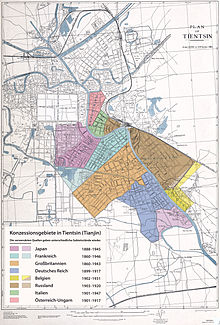Foreign concessions in Tianjin
former concession territories of Qing China
The foreign concessions in Tianjin (formerly romanized as Tientsin) were concession territories ceded by Qing China to a number of European countries, the United States and Japan within the city of Tianjin. There were altogether nine foreign concessions in old Tianjin on the eve of World War II. These concessions also contributed to the rapid development of Tianjin from the early to mid-20th century. The first foreign concessions in Tianjin were granted in 1860. By 1943, all the foreign concessions, save the Japanese concession, had ceased to exist de facto.

Quotes
edit- For three or four Chinese coppers, I could ride in a rickshaw from my home, in England, to Italy, Germany, Japan, or Belgium. I walked to France for violin lessons; I had to cross the river to get to Russia, and often did, because the Russians had a beautiful wooded park with a lake in it.
- The beginning of the first two concessions, the British and the French, were “foul and noxious swamps, around them, on the dryer grounds, were the numerous graves of many generations of people”.
- Hersey, “A reporter at large: homecoming. I: the house on New China Road”, New Yorker, 10 May 1982, 54, cited in Maurizio Marinelli, “Making Concessions in Tianjin: Heterotopia and Italian Colonialism in Mainland China.” Urban History 36, no. 3 (2009): 404 In the words of the editor of the Chinese Times, Alexander Michie.
- The foreign areas look for all the world like modern Western cities, with great modern Temples of Finance, massive business premises, and well-built residences.
- Hersey, “A reporter at large: homecoming. I: the house on New China Road”, New Yorker, 10 May 1982, 54, cited in Maurizio Marinelli, “Making Concessions in Tianjin: Heterotopia and Italian Colonialism in Mainland China.” Urban History 36, no. 3 (2009): 404 Tientsin, North China published by the Tianjin Rotary Club in 1934.
Belgian concession
edit- Although China attracted Belgian investors and missionaries from the 1860s, it is especially after 1900 that major investments began to take place in various industrial, financial and commercial sectors, such as banking, railways, metallurgy and real estate. The most famous companies were the Banque sino-belge, the Compagnie financière belgo-chinoise, the Société belge d’entreprise en Chine, the Compagnie générale des chemins de fer en Chine and the cfeo. The Beijing-Hankou (present Wuhan) railway line, the mines of Lincheng, the trams of Tientsin and the steel mills of Hanyang were among the most successful results of the Belgian “informal empire.”
- Ginette Kurgan-Van Hentenryk, Léopold II et les groupes financiers en Chine. La politique royale et ses prolongements, Brussels: Palais des Académies, 1972 (Mémoires de la classe des lettres, 2e série 61-2).
British concession
edit- Japanese actions during the Tianjin incident is part of its 'new order' policy meant to completely squeeze out British influence in China
- Watt, D.C. How War Came, New York: Pantheon Books, 1989 page 353
- The British Municipal Council was empowered to install gas, water, and electric supply; tramways, or other means of facilitating transit of wayfarers or goods, or to grant concessions to others to do so”.
- Hersey, “A reporter at large: homecoming. I: the house on New China Road”, New Yorker, 10 May 1982, 54, cited in Maurizio Marinelli, “Making Concessions in Tianjin: Heterotopia and Italian Colonialism in Mainland China.” Urban History 36, no. 3 (2009): 404 With the development of the concessions, foreign authorities also introduced modern municipal infrastructures to the concessions in Tianjin, the planning and construction of which were confirmed in regulations and byelaws. Taking the British Concession as an example, in Land Regulations of the British Municipal Extension, Tientsin 1898.
- As the chairman of the Municipal Council of the British Concession in Tianjin, W. W. Dickinson, reported to the consul in Tianjin, these regulations were “based on those which obtain in Shanghai and in the British Concession, and the committee made modifications and additions as past experience and present exigency seem to justify.
- Hersey, “A reporter at large: homecoming. I: the house on New China Road”, New Yorker, 10 May 1982, 54, cited in Maurizio Marinelli, “Making Concessions in Tianjin: Heterotopia and Italian Colonialism in Mainland China.” Urban History 36, no. 3 (2009): 404 the British Municipal Council of one treaty port would actively reference existing regulations of other British Concessions. With the gradual improvement of the municipal administration system of the British concession in Tianjin, the British Municipal Council took over the legislative work, in which the council always followed the model of Shanghai. In 1898, a committee was appointed by the Municipal Council of Tianjin to make new regulations for British Municipal Extension in Tianjin.
United States concession
edit- I was detailed with the 15th Infantry to rescue missionaries that were being trapped there. It was like they were prisoners — they couldn't even come out of their billets without getting fired on or having rocks thrown at them.
- Eileen Wilson (30 May 2011). "World War II vet recalls battle on two fronts". granitbaypt.com.
See also
editExternal links
edit- Concession Buildings in Tianjin
- WorldStatesmen: China
- Tianjin Museum of Modern History
- Tianjin under Nine Flags at University of Bristol